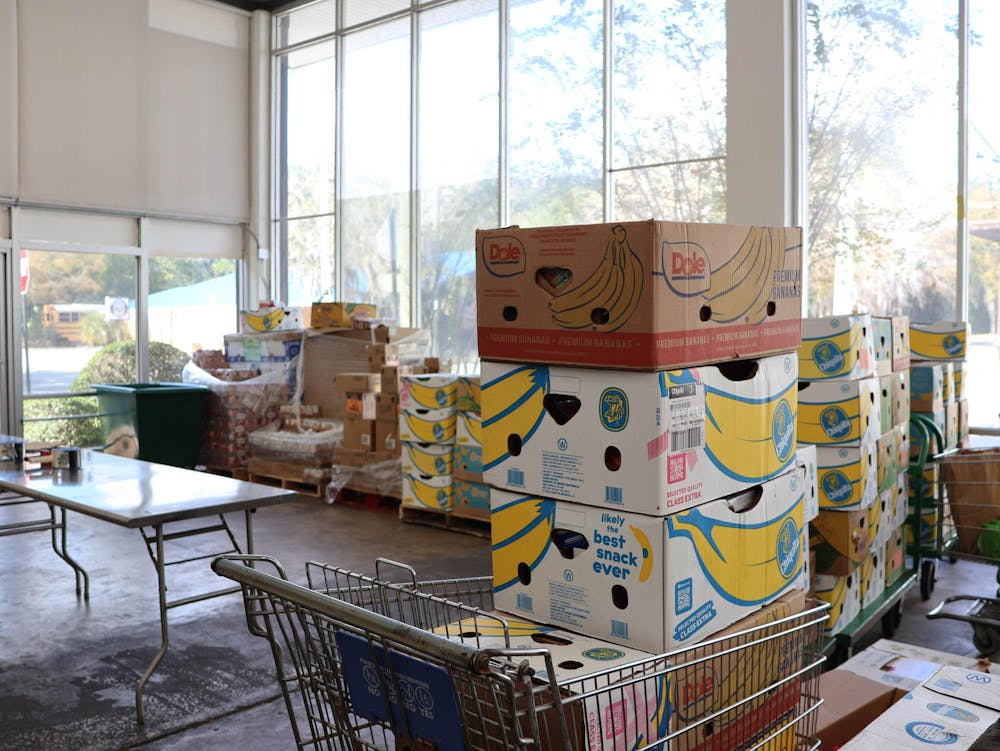Read more from The Alligator's "Ripple Effects" special section here.
Alachua County’s hunger-relief network is being forced into a test it hasn’t faced in years: whether community charities can absorb the fallout of shrinking federal support.
Nearly 10,000 households in Alachua County receive Supplemental Nutrition Assistance Program benefits as of 2023, of which a little over one-third have children, according to the U.S. Census Bureau’s American Community Survey. Those recipients have been at risk of losing critical food aid since Nov. 1, when funding for SNAP lapsed amid the longest federal government shutdown in U.S. history.
The government said it would send states money on Nov. 7 to fully fund SNAP. But later that night, the U.S. Supreme Court temporarily granted the Trump administration’s request to block full benefits, giving the court of appeals time to weigh in on the matter.
SNAP, formerly known as food stamps, is the largest anti-hunger program in the U.S. In Florida, nearly one in eight people rely on its benefits.
Food banks overwhelmed
With SNAP benefits being cut, some will have to make the difficult decisions between paying rent, buying groceries or filling their kids' prescriptions, said Patrick Dodds, the executive director of Bread of the Mighty Food Bank.
The North Central Florida-based bank heavily relies on donations to provide for families and works with around 150 partner agencies to deliver food to families in need.
Since the cuts, those agencies told him they’re seeing double the amount of people they normally serve, making food distribution more difficult.
Dodds has already seen the impacts on families.
“You’ve got a lot of people right now that are feeling hopeless,” he said. “They don’t know how they’re going to feed their families.”
Soon after the cuts were announced, the Alachua County Commission agreed to support the food bank with $100,000, and two days later, the Gainesville City Commission matched that donation.
But Dodds said the funding will only last so long. SNAP recipients won’t see funds in their accounts for at least a week, he said.
“A week without that funding is catastrophic,” he said.
With the holiday season already being a busy time at food pantries, the addition of SNAP cuts will likely overwhelm them, said Laurie Porter, the development director at community service organization Catholic Charities Gainesville.
She said she’s begun to see a ripple effect of the SNAP program within the past two weeks, serving about 350 people on Nov. 4.
“Everybody who is coming in is worried,” Porter said. “Everybody who is coming in is in some sort of a crisis.”
Gainesville has high rents and utilities, but some of the lowest paying jobs, she said. Nearly two-thirds of Gainesville renters were cost-burdened, meaning they gave at least 30% of their annual income to housing costs, in 2023.
As a result, there’s always people who are going to need food assistance services in the city, she said.
“Even when they were getting SNAP, they were still struggling,” she said. “It’s now they’re just struggling even more.”
The impact has been almost immediate, said Jorge Peraza, development director at Brother’s Keeper. The Ocala-based social service outreach provides emergency services, rental assistance and a soup kitchen.
Peraza said there are an unprecedented amount of new faces coming into the pantry needing assistance. He worries because the food banks and agencies he works with can’t manage everything on their own.
While Peraza is relieved people are looking for the help they need, the pantry can’t sustain everyone who needs it.
“Everybody’s struggling,” he said.
A community stepping up
One Gainesville resident recognized the stress on food banks even before the SNAP cuts took effect.
Melissa Jackson created her own community food bank right on the corner of 16th Avenue and Second Street, just six minutes away from UF.
After seeing the need for food assistance in her local community roughly three months ago, Jackson spearheaded the pop-up pantry with her wife.
Within the past week, she has noticed more donations. She’s taken to Facebook to “blast” the location of the box for people in need to visit.
In any given week, she typically receives about two donations. Since the SNAP cuts were announced, she received five donations in a single week from people bringing in anything they could.
Jackson said the community has expressed gratitude for the plethora of food, which is inclusive to meat-eaters and vegans alike.
“The food banks do the bulk of the work,” she said. “But these small efforts help.”
Contact Sofia Bravo at sbravo@alligator.org. Follow her on X @sofiab026.

Sofia Bravo is The Alligator's Spring 2026 opinions editor and a junior journalism and political science student. She previously served as the enterprise health reporter, a copy editor and a translator. In her free time, she enjoys reading and bothering her friends with her digital camera.






